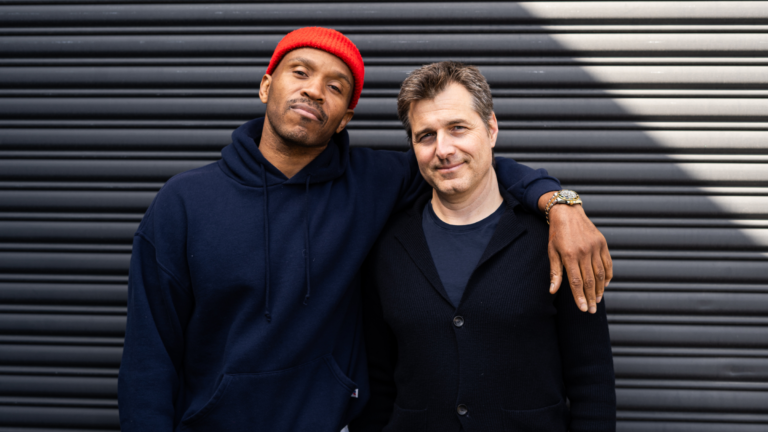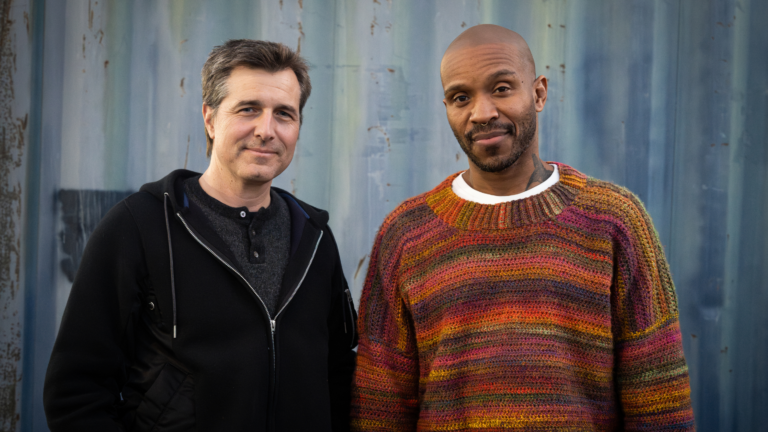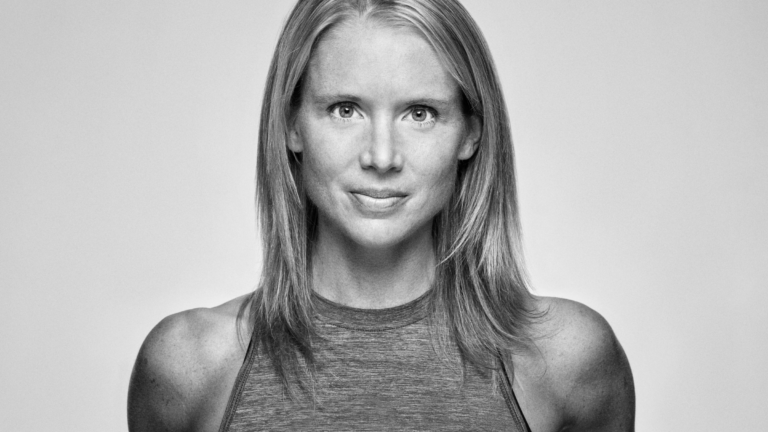This week’s conversation is with Sarah Fay, an award-winning author and mental health advocate working to improve how we think and talk about our mental health.
Sarah’s experience of being diagnosed with six different mental health disorders over the course of 30 years and finding no relief led her to write her best-selling journalistic memoir Pathological: The True Story of Six Misdiagnoses.
As part of her continued devotion to changing the conversation around mental health, Sarah also founded Pathological: The Movement, a public awareness campaign dedicated to empowering people to make informed decisions about their mental health.
In this conversation, Sarah opens up about how she came to inhabit her diagnoses, how we can improve the diagnosis process, and her inspiring journey to recovery.
With almost one in five citizens (47.1 million people) in the U.S. alone having been diagnosed with a mental health condition, there’s no doubt that a majority of us have been touched by this issue – I hope this conversation gives you a new framework for navigating the complexities of mental health, and a deep knowing that no one is in it alone.
“I have fully recovered from serious mental illness and I was actually scared to tell people, because in 25 years, the word ‘recovery’ was never spoken to me. I was never told that that was even a possibility.”
In This Episode:
This is NOT anti-psychiatry
When we start to criticize psychiatry or we start to criticize diagnoses or even put them under a microscope, people assume I am anti-psychiatry. I’m not at all. I see a psychiatrist still, he’s wonderful, and he’s very transparent with me about all these things. What I wanted to do instead was bring to people everything I wish I’d known. And what’s interesting, is one GoodReads reviewer said, my book is dangerous. And I thought that was so fascinating. I shouldn’t read those types of reviews, but actually at first it really disturbed me because I want to be a good person and I don’t want to produce anything that’s dangerous. But then I thought, why is it more dangerous to educate people before sending them or their children into the mental health system? How could that possibly be dangerous as opposed to sending them in unknowingly, not being able to really be empowered to make the decisions about their mental health that they need to make?
The DSM (Diagnostic and Statistical Manual of Mental Disorders)
It’s essentially the manual that psychiatry has developed for clinicians to use to diagnose patients with – could be major depressive disorder or generalized anxiety disorder, bipolar disorder, whatever it would be. But everything, those three ways that it can be used are so vital and important. I’m also not one of those people who wants to throw the DSM out the window. I don’t think that’s valuable at all. I needed help and people need help and I needed treatment, and people need treatment. It’s what we have, it’s what we’re using right now. Where I think it gets dangerous, is that the DSM has become a work of culture. It has filtered into the mainstream. We’re using it, unqualified lay people we’re diagnosing each other. We’re self diagnosing on TikTok. Teens are self diagnosing on TikTok. There are TikTok therapists throwing out diagnoses. And that is where I think we’ve crossed the line.
Her reaction to her diagnoses
I used every diagnosis I got against myself. I used it to limit myself. I have major depressive disorders, so I can’t do X, Y, Z. This means I am this way. More importantly, every emotion and thought, so troubling emotion, unsettling thought was because of my diagnosis. I never learned how to process emotions. I never knew what emotions were until a few years ago. And I’m 50, that should not be the case. I didn’t know how to manage my mind. I didn’t know how to relate to my brain or how the brain worked. The diagnosis became everything. It was my identity.
Bipolar II Disorder
With the fourth edition of the DSM, they created bipolar two. And this isn’t a fair way to describe it, but bipolar light. So you didn’t have to have mania, you could have hypomania, you didn’t have to have depression, you could have dysthymia. You didn’t have to be quite so on either extreme. And the danger there for me, so I received the bipolar two diagnosis first, which happens to a lot of people, and it’s kind of, for lack of a better term, the gateway drug to bipolar one. It’s very easy to slip from bipolar two to bipolar one as opposed to before 1994 when you had to really show the extremes of bipolar one to even get near it. Those are very extreme states. And Allen Frances, who was one of the chairs of the DSM for task force committee who created bipolar two, has said they made a mistake and that it really created a false epidemic of people being told that they have bipolar when they don’t.
A bottleneck in the system
Right now with the mental health crisis among teens and children, my understanding is some people have to wait a year to see a child psychiatrist. That it’s that backed up, the mental health system is that clogged. Again, but one thing I did learn, and I didn’t know this, and I know this is uncomfortable and it may not be the most effective way, but you can ask your GP to consult with a psychiatrist. You can do that.
Recovery from mental health disorders
This version of recovery and the AA model, they are different with substance abuse disorders or problems, there are different models, but the AA model specifically is that idea that you are always an alcoholic. In the recovery community you are actually, the third stage of recovery is you’re moving past your diagnosis. I am not someone with any diagnosis anymore because I’ve recovered. And what’s fascinating is that in recovery, we don’t ever talk about diagnoses ever. We talk about experiences and we talk about troubles, and we talk about emotions and thoughts and behaviors and how our lives are and our context and how much money we’re making. All of these things really, we know that this contributes to our mental health. And the biomedical model also allows us to sidestep social injustice and economic inequality.
Recovery comes in many different forms
The modality doesn’t matter. Meditation, therapy, whatever it’s going to be for you, for me it’s cats. Whatever it’s going to be, the modality doesn’t matter, what matters is hope. It matters If you believe you can and it matters that you have a connection to the people helping you, that’s what matters. And so that is the future of mental health. And as peer recovery specialists, that’s what we do. So what I do is I give people hope where there isn’t any. I show people their strengths when no one else will and when they can’t see them.
Peer recovery specialists
Sometimes peer recovery specialists and the recovery community is seen as being separate from clinicians, but the goal is to work together. I don’t have best practices, I have a lived experience. I can’t do what you do. It’s us working together that’s going to make the difference, just so people are clear. It’s not about replacing clinicians or even knowing more, because I don’t. All I can do is listen in a way that maybe someone else can’t, because I’ve been there. We do not give advice ever. We offer resources.
Different levels of suicidality
One thing that can be helpful, which I didn’t know, is that there are different stages or degrees of suicidality. To think about suicidality isn’t actually abnormal, to think a lot about it, but to have a straight thought here and there is probably not something to worry about. Where it gets something to worry about is that if those thoughts are persistent and if you start to have a plan, that is an emergency situation.
Warm lines
The other thing I wish I had known is there’s something called warm lines instead of hotlines. And I had never heard of these. And so one for instance I’ll mention is Wildflower Alliance has one. There are many around the country. You can just Google warm lines. And those are for people maybe not fully in crisis, but concerned and knowing they need help. It’s not a hotline. You’re not going to go straight through to 911 unless it really feels urgent and they’ll talk to you about that. But it’s another resource that I knew nothing about. And so I would just offer those having an emergency plan, 988 and also warm lines. And then looking for peer recovery support centers, which are in all major cities. And then also there’s something called peer respite centers. And those are for people who would like an alternative to emergency rooms if they are experiencing suicidality or psychosis.
The effect on family
One [reader of my book] criticized me for having my family’s support. And anyone who’s been through serious mental illness knows it’s not that. I was estranged from my family for many years. I withdrew, I pushed my father and my stepmother away. I was salient. I regret so much of those behaviors. And then I was unable to live independently once I was in my 40s. And I lived with my mother. Over those five years of me being in and out of psychiatric crisis and suicidal and she was on suicide watch all that time. She’s in her 70s at this point. I wish, my mother is such a vibrant, amazing woman, really just whip smart and loves archeology now that she’s retired, that gets her going. She’s just one of those people that lights up a room. By the time I had been there for five years, she just looked sallow and fragile and I had just worn her down. I don’t want to make anyone else feel that way about their family. But the truth is I did. She would never say this, she would never have let me feel that, just being on suicide watch is not something any human being should be asked to do except a trained professional. It’s too much responsibility. It just is. I’m so grateful to her. But I wish I could give her those years back and all of that.
Helping others can help you
It wasn’t until I became a peer recovery support specialist that I knew I would never go back and that I wasn’t in remission. Because then I was giving back, then I was helping others and I could help others. It slowly came out that certain emergencies happened in our family and I was the one who stepped up. And that had never happened before. I was like, whoa, something’s going on. This is different. But I just wanted to mention that and how important it is that we do that. And all the things that you said you see in me, I see in so many people or the potential there who are suffering from serious mental illness and more mild versions of our human experience or I should say more intense versions of our human experience like anxiety and depression and all of that. I think that potential is in all of us.
Mental health is multifactorial
One thing we do know about mental illness, and I think that this is probably one of the few things that we know, is that it is, like you said, it’s very complex and there are really five factors that go into it. It might be a little biology and hereditary, but we don’t know a whole lot there. And we have not been able to pinpoint anything. But certainly it could be a factor and it is a factor. But trauma is a factor, personality is a factor, environment is a huge factor. And then also that if we can catch it early within the first year, we have a much better of not having people go down the path to serious mental illness. We know that mental illness builds on itself. So the longer you’re in that state, and to me the longer you’re not offered the chance to recover, the harder it’s going to be and I think the more serious it can be.
Accepting who you are and honoring your journey
We aren’t all sick. We just aren’t. And I say that not to disregard anyone’s pain, but I have to tell you, life sucks for me a lot of the time. I’m human, I have black waves of depression, I still have panic attacks. I had one last week. There’s no way to escape that. So you ask what I do, I remind myself of that and I remind myself that I’m having a human having a human experience and I am going to experience these things and I’m going to be nervous and I’m not going to want to be in social situations because I love to be at home with my cats and writing. That’s just who I am. But as I recovered and I think this is also important for people, I really had to accept parts of myself that are unattractive in American culture. I really love being alone. I’m very fulfilled with my writing and my work and reading and other things and my cats. And so it’s weird. It’s not a very sexy thing to me in this culture and that’s okay. I don’t know why that is. But things like that, I don’t like to travel unless it’s for work. Things that are not really, I had to accept them, and my mistake in recovery was thinking I had to actually become everybody else or what we think, whatever this idea we’re throwing around for your race, culture and economic situation. Because we all have different ideals of what that might be. I thought I had to be the ideal. And the thing that works for me is just continuing to find out what I like and what I don’t like and honoring it.
Recovery requires work
My mental state deteriorated for 25 years and I have to be very respectful of that. It doesn’t mean I have bipolar lurking in me waiting to come out. It doesn’t mean I have major depressive disorder. It means I’ve been through hell and it means that I have to take care of myself. And even if you haven’t been through, quote unquote, hell, if you’ve been through anything, we have to honor that and not think we have to go back and be the, I don’t know what you would be, but the person at the party or whatever. You can be the person at the party. I don’t know why I’m thinking of parties. But that we really honor what we go through.


